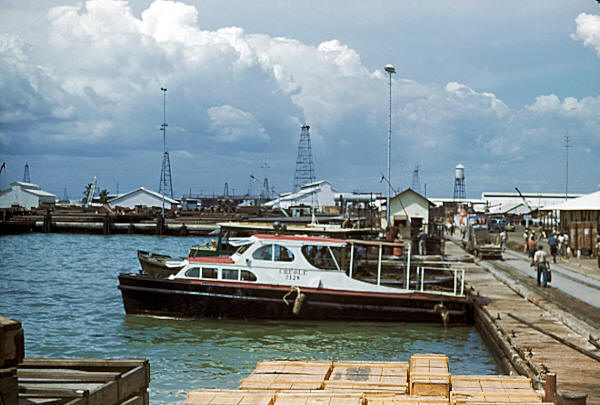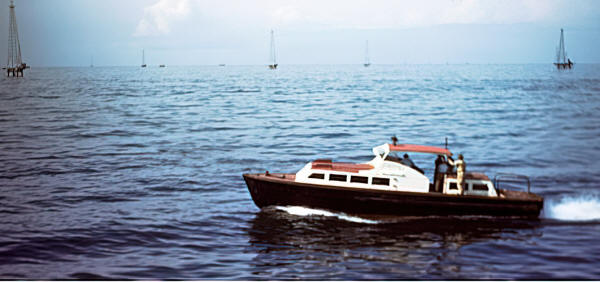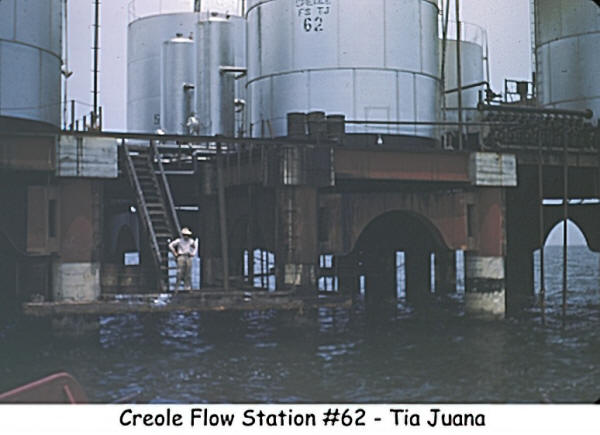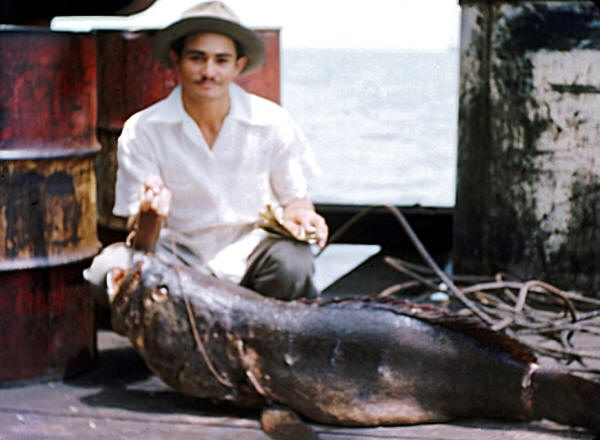Home
 Ondas del Lago
Ondas del Lago
 Contributed Content
Contributed Content
 Steve Sleightholm
Steve Sleightholm
 Steve's Venezuela Memoirs
Steve's Venezuela Memoirs
 Going Fishing
Going Fishing
Steve Sleightholm's Venezuela Memoirs
Going Fishing
One of the few things that my brother, sister and I looked
forward to was the ferry ride between Palmarejo and Maracaibo. I think the
reason for the excitement it generated when we were young was that it was so
different. Sure, we took a launch out fishing on Sundays, but that still did not
take away from the anticipation of the ride.
Now, my family lived on the eastern shore of Lake Maracaibo and over the twenty
years that I lived in Venezuela, I must have taken at least 50 rides on the
ferry.
At one time, Creole would take us to Maracaibo and bring us back on one of their
newer launches. It could be an exciting ride, but it was very long and if the
weather made the surface of the lake choppy, the ride could be exhausting. Most
of the times that we took a launch was when we were going to catch a plane to go
on vacation or returning from vacation. But that practice eventually ended and
we would have to make the long drive to Palmarejo to catch the ferry.
Then sometime in the early ‘60s an outfit in Cabimas established a high-speed
hydrofoil service to and from Maracaibo. Well, that was progress. They built a
modern dock in Cabimas with a nice covered passenger building. But you know my
memory of the “Fletcha” as it was referred to, was that when I had to use the
restroom, I noticed that the Venezuelans who had never utilized a flush toilet
in their lives would throw the soiled toilet paper on the floor in a corner of
the room. Some things make an impression on you that last a lifetime. The
hydrofoil was a real thrill though; as the engines revved up it would gradually
lift free of the water and it actually flew through the water on short, stubby
wings that remained below the surface of the water. That always amazed me but in
the back of my mind was what would happen if it hit a log that had washed out of
one of the rivers feeding the lake during rainy season. Never happened.
The opening of the bridge was the beginning of new chapter leaving a quaint way
of life
My memories of fishing in Venezuela begin at a very young age…..
The rainy season was upon us again with torrents of rain falling from the dark
sky accompanied by flashes of lightning with the thunder rolling in and out
again like a freight train passing in the distance. Hollywood was a rather new
camp at this time and the only provision for drainage were ditches on each side
of the camp streets which were really insufficient to handle the large
quantities of rain that fell, so they would fill up to the brim and in some
cases overflow across the streets.
This was one of my favorite times of the year because while Dad was at work, Mom
would permit my brother and I to have full run of the camp and there was nothing
better than running barefooted down the flooded streets with my close friends,
Palmer Bazemore and Mike Peters. I guess I was about four years old at the time.
The thrill of the falling cooling rain and the water was exhilarating.
Another thrill was attempting to catch the small fish that because of the high
water and a poor floor control system were able to swim up from the lake. These
were very small fish and they presented a challenge to us as we tried to scoop
them into empty mayonnaise jars or KLIM cans using the strainers that we took
from our mother’s kitchens. We would keep the fish for a while in jars in our
rooms at the house. They seemed to disappear when we lost interest in them.
After Dad was transferred to Campo Verde, Tia Juana in 1949 with both my
friends’ families following shortly thereafter, we eventually discovered that
the camp had a flood drainage system no more effective than that of Hollywood.
The small camp consisting of about four streets and no school and was prone to
flooding every rainy season. The camp had been constructed in a marsh area next
to the lake shoreline and at that time there was no obvious dike. When the
company dredged its harbor it deposited the sand in the area where the camp was
built filling in the marsh. So the land along the lakefront that had not been
built upon consisted of sand and was referred to as “the dredge”. Razor grass
grew well there along with other vegetation including burr grass. There were no
trees, just low shrubs here and there.
Campo Verde was a beautiful camp having most of its houses on elevated concrete
stilts to avoid flooding and had been fully landscaped with mature coconut palms
painted with white lime at the bases and a variety of flowering shrubs, mango,
mamone, tamarindo trees, guayaba and an assortment of fruit bearing trees. It
was a child’s paradise.
Anyway, the street ditches discharged into a main ditch which ran parallel to
the lake and into a large basin - more like a pit - which was pumped discharging
into the nearby lake. This flood surge basin was a young fisherman’s delight. My
friends and I would take white bread for bait from our mothers, heavy cotton
string which was used for flying kites and itsy bitsy fishing hooks and off we
would go to the basin. There we would find a spot near the water where we could
not fall in and then take a piece of white bread rolling it into a dough ball
between our fingers with the assistance of a little spit and lower the hook into
the water where we could see small flat-sided fish swimming about. The fish were
no larger than the palm of our hands and weren’t even edible as far as I know. I
never ate one, but the thrill was just catching them and then comparing the
sizes to see who caught the largest fish.
We would do this for hours under that blistering hot sun, wearing just shorts
with Keds on our feet and no shirt, or hat. Always in the background was the hum
of the motors and rhythm and squeal of rubbing metal from the pumping jacks that
endlessly nodded and dotted the dredge accompanied by the ever present stink of
spilled oil that soaked the ground around the pumps. Damn, it got hot!!! I hated
the long stifling hot walk back to the camp which was way off in the distance.
This was the days before we had bicycles and even then the ride back to camp was
always long and stifling.
So, time passes and we approach our early teens and the Company management is
beginning to think more about how to provide entertainment for its employees and
their children. We now had a nice staff school and a brand new country club
which was the envy of the other camps and on Sundays, the Company provided a
work launch for fishing excursions out onto the lake.
Dad did not fish; I don’t think he liked the lake at this point in his career –
too many years on the lake. Anyway, Bill and I liked to go fishing and we
prepared for it by purchasing fresh shrimp off the fish truck which came through
camp periodically, having spare hooks and lead weights and at least two spools
of heavy duty string fishing line. We fished the Venezuelan native way.

So, Dad would drop us off at the pier where we met mostly
bachelors who were going out to fish. They would load coolers of iced beer and
some sodas and ice for the fish we caught. The Venezuelan boat crew would untie
the boat and take it lazily rocking out of the harbor. I loved the rumble and
sensation underfoot of the powerful twin diesel engines under the red painted
steel deck access doors – this was one of the new faster workboats. The hot
engine exhaust would boil to the surface leaving a small short-lived puff of
steam and lingering small of diesel fuel in the air. Everyone would settle down
either in the few deck benches or below deck where there were additional benches
in two rows and the faint odor of sweaty bodies. I would walk along side of the
cabin topside to the bow of the boat and sit on the roof of the passenger
compartment to feel the breeze on my body as the boat capitan pushed the twin
engine throttles full open. What a treat!! The launch would speed towards its
objective.

At some point, the capitan would call either Bill or I over and
let us take control of the boat while pointing out a well or flow station in the
far distance that was our fist fishing location. Now this was a thrill, to guide
that huge powerful workboat at full throttle. When we hit choppy water it was
even more thrilling. The capitan and his crew were down below deck stretched out
sleeping on the benches. When we approached the objective one of us would call
down below for the capitan and he and his small boat crew would come up and take
control of the boat. I was amazed as his skill as he would approach the well or
flow station platform with the boat rocking back and forth by swells and he
would back it in close enough for a crewmember to jump to the platform and
secure the launch.

That was when serious fishing began. If we were at a well, then
our objective was to drop the line close to a piling as the fish congregated
around the pilings. We were way out in the lake fishing in about sixty feet of
water. Bill and I would make sure the hooks and lead weights were securely
fastened and then we would bait the hook with a shrimp then sitting on the side
of the boat we would drop the baited hook over the side of the boat playing out
the line until we felt the lead weight hit the bottom and then we would lift the
baited hook about a foot off the lake bottom. Now, if you ever watched the
Venezuelans fish from their skiffs they would let the rise and fall of the boat
and an occasional lifting of the hand held line as a means of attracting the
fish. Well, that’s how Bill and I fished.
The lead weight was heavy enough to old the line fairly taunt so when a fish
nibbled on the bait or for that matter rubbed against the bait you could feel
the vibrations and all we had to do was jerk the line upward. In most cases,
believe it or not, that meant a hooked fish. Since we were not sports fishing, -
the objective being catch fish and get into boat quickly so you can catch
another – we would quickly pull in the line and bring the fish on board. A real
treat was to catch one of the huge lake perch. The black perch being most
prized. The fish could up to 15 inches long and were so so tasty!! The next
favorite was the corbina and then the palometto. These fish also could be very
big and were highly prized.
It wasn’t unusual to catch a damn bagre (a form of catfish), the filth things.
When you got them on deck, you had to watch out for they had a dorsal fin
containing a sharp spine which they would raise as they bounced about the deck
all the while emitting croaks. I knew of two occasions where my brother in his
haste to get one off his hook, drove a spine through the sole of his tennis shoe
and into his foot. Fortunately he did not end up with a nasty infection. The
second time the fish spiked his knee while whipping around on his line. The best
way to handle the damn things after you caught one was to club it to death and
then remove the hook. The slimy filthy things……
Occasionally you would hook something immobile on the bottom and that was it for
the hook and leader and maybe even the lead weight. I once saw a guy catch a
freshwater ray – it was huge. Another time a guy standing on the platform of a
closed-in well which was about 20 feet above the lake surface caught and brought
to the surface after a long fight with a spinning road and reel a huge lake
catfish. Well, there was no way he could lift it from the water so he cut his
line. Using a rod and reel to fish in that deep water made no sense at all.

A day fishing could involve visiting several different wells or
flow stations as we searched for “the” spot and all the while that glaring sun
beat down on you from above and from the reflecting water surface. At the end
the ice chests were full of fish and everyone was exhausted and the captain
would take the launch back to the harbor. Bill and I would take our catch back
home where Mom would gut and scale the fish. I would help her, but Bill could
not stand the smell or sight and was out of sight before we even began the work.
The next day, for lunch, Mom would serve baked fish, scalloped potatoes and
stewed tomatoes with a nice fresh cold salad and iced tea. Hmmmm….. Life
couldn’t be any better than that.
 Previous
Page Next Page
Previous
Page Next Page

Index
